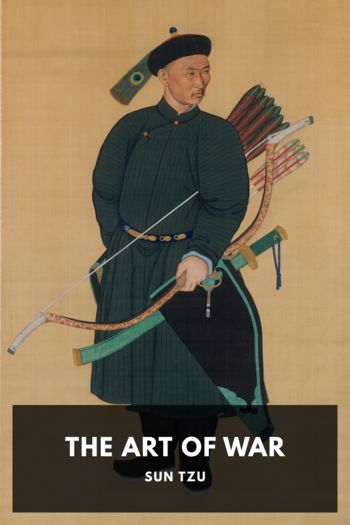The Art of War by Sun Tzu (elon musk reading list TXT) 📕

- Author: Sun Tzu
Book online «The Art of War by Sun Tzu (elon musk reading list TXT) 📕». Author Sun Tzu
起, the Yü Lan’s variant for 動, is adopted by Li Chʽüan and Tu Mu. ↩
Sun Tzǔ may at times appear to be overcautious, but he never goes so far in that direction as the remarkable passage in the Tao Tê Ching. ch. 69: 吾不敢為主而為客不敢進寸而退尺 “I dare not take the initiative, but prefer to act on the defensive; I dare not advance an inch, but prefer to retreat a foot.” ↩
Again compare Lao Tzǔ, ch. 68: 善戰者不怒. Chang Yü says that 愠 is a weaker word than 怒, and is therefore applied to the general as opposed to the sovereign. The Tʽung Tien and Yü Lan read 軍 for 師, and the latter 合 for 致. ↩
This is repeated from chapter XI (“When it was to their advantage …”). Here I feel convinced that it is an interpolation, for it is evident that the next paragraph ought to follow immediately on the previous. For 動, the Tʽung Tien and Yü Lan have 用. Capt. Calthrop invents a sentence which he inserts before this one: “Do not make war unless victory may be gained thereby.” While he was about it, he might have credited Sun Tzǔ with something slightly less inane. ↩
According to Chang Yü, 喜 denotes joy outwardly manifested in the countenance, 悅 the inward sensation of happiness. ↩
The Wu State was destined to be a melancholy example of this saying. See note 325. ↩
警, which usually means “to warn,” is here equal to 戒. This is a good instance of how Chinese characters, which stand for ideas, refuse to be fettered by dictionary-made definitions. The Tʽu Shu reads 故曰, as above (“Hence the saying: The enlightened ruler …”). ↩
It is odd that 全軍 should not have the same meaning here as in chapter III (“In the practical art of war …”, q.v.). This has led me to consider whether it might not be possible to take the earlier passage thus: “to preserve your own army (country, regiment, etc.) intact is better than to destroy the enemy’s.” The two words do not appear in the Tʽung Tien or the Yü Lan. Capt. Calthrop misses the point by translating: “then is the state secure, and the army victorious in battle.” ↩
間 is really a vulgar form of 閒, and does not appear in the Shuo Wên. In practice, however, it has gradually become a distinct character with special meanings of its own, and I have therefore followed my edition of the standard text in retaining this form throughout the chapter. In chapter VI (“In making tactical dispositions …”), on the other hand, the correct form 閒 will be found. The evolution of the meaning “spy” is worth considering for a moment, provided it be understood that this is very doubtful ground, and that any dogmatism is out of place. The Shuo Wên defines 閒 as 隟 (the old form of 隙) “a crack” or “chink,” and on the whole we may accept 徐鍇 Hsü Chʽieh’s analysis as not unduly fanciful: 夫門夜閉閉而見月光者有閒隟也 “At night, a door is shut; if, when it is shut, the light of the moon is visible, it must come through a chink.” From this it is an easy step to the meaning “space between,” or simply “between,” as for example in the phrase 往來閒諜 “to act as a secret spy between enemies.” Here 諜 is the word which means “spy;” but we may suppose that constant association so affected the original force of 閒, that 諜 could at last be dropped altogether, leaving 閒 to stand alone with the same signification. Another possible theory is that the word may first have come to mean 覗 “to peep” (see 博雅, quoted in Kʽang Hsi), which would naturally be suggested by “crack” or “crevice,” and afterwards the man who peeps, or spy. ↩
Cf. II, “In the operations of war …” and “With this loss of substance …”. ↩
怠於道路, which is omitted by the Yü Lan, appears at first sight to be explained by the words immediately following, so that the obvious translation would be “(enforced) idleness along the line of march.” (Cf. Tao Tê Ching, ch. 30: 師之所處荆棘生焉 “Where troops have been quartered, brambles and thorns spring up.”) The commentators, however, say that 怠 is here equivalent to 疲—a meaning which is still retained in the phrase 倦怠. Tu Mu refers 怠 to those who are engaged in conveying provisoins to the army. But this can hardly be said to emerge clearly from Sun Tzǔ’s text. Chang Yü has the note: “We may be reminded of the saying: ‘On serious ground, gather in plunder’ [chapter XI]. Why then should





Comments (0)